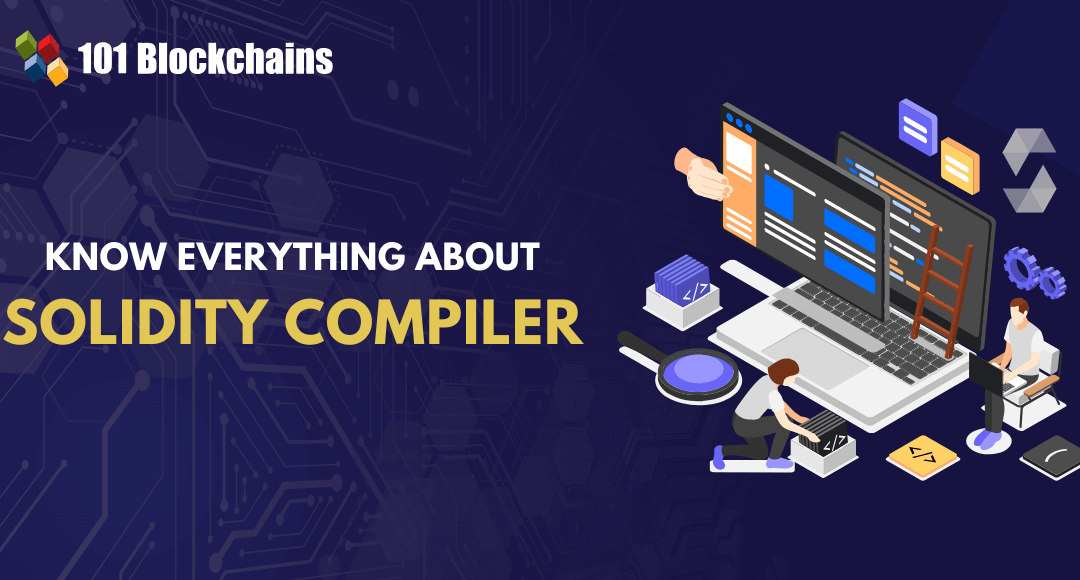Ethereum is the biggest playground for developing smart contracts in the existing blockchain landscape. Developers trust Ethereum as it was the first blockchain to introduce the benefits of smart contract programmability. The ideal programming language to create smart contracts on Ethereum is Solidity. It offers a wide range of features that help in development and implementation of smart contracts. However, you have to install Solidity compiler to deploy smart contracts according to your desired use case.
Ethereum developers must use a compiler to ensure that the Ethereum Virtual Machine or EVM can interpret and execute the commands in the code. In other words, the Solidity compiler facilitates conversion of the code to a set of byte instructions. Let us learn more about a Solidity compiler, how to install one, and the important Solidity compiler tools.
Build your identity as a certified blockchain expert with 101 Blockchains’ Blockchain Certifications designed to provide enhanced career prospects.
Understanding the Fundamentals of Solidity Compiler
Solidity is a popular programming language for creating smart contracts on Ethereum blockchain. It has gained significant improvements in popularity as the demand for web3, dApps, and smart contracts grows exponentially. Therefore, it is important to know about all the essential tools to create smart contracts with Solidity.
The answers to ‘What is Solidity compiler’ primarily focus on its nature as an open-source compiler that helps in translation of code in Solidity programming language to bytecode. It serves as the bridge for communication between developers and the Ethereum Virtual Machine. Solidity compiler ensures that the smart contract code follows the important rules and requirements associated with Ethereum blockchain.
You can come across two different types of Solidity compilers, such as solc and solc.js. The original version of Solidity compiler has been written in Go programming language. On the other hand, the fundamentals of Solidity compiler explained for beginners also emphasize how solc.js leverages Emscripten for compiling C++ code to JavaScript. The Node.js library, alongside the solcjs command line tool, helps to assemble Solidity files. Furthermore, it also uses JavaScript for compilation with the advantage of flexible installation.
Are you aspiring to learn the fundamentals of the Ethereum Virtual Machine and smart contracts’ upgradability? Enroll now in the Advanced Solidity Development Course.
How Does the Solidity Compiler Work?
The working of smart contracts is a complicated process from a technical perspective. You can look at them as automated contracts that execute upon fulfillment of certain conditions. On the other hand, smart contracts depend on code to make everything possible. Developers write code in a language they can understand.
However, machines must understand the smart contract code to execute them successfully. Compilation of smart contract code to bytecode is an important requirement to help the EVM understand the code. Bytecode primarily includes binary computer instructions and is deployed directly to the Ethereum blockchain.
The process to compile Solidity code also leads to the generation of an Application Binary Interface or ABI. It serves as the interface between program modules, such as user programs and operating systems. The bytecode deployed on Ethereum blockchain is saved at a specific address that would be publicly available and allows everyone to interact with the smart contract.
The address represents the instance of a deployed contract and also offers persistent storage for the maintenance of internal state of the smart contract. Native cryptocurrency of Ethereum, ETH, offers a store of value and a trusted method of payment to facilitate execution of smart contracts on the blockchain.
What are the Special Highlights of Solidity Compiler?
Solidity compiler is an integral part of the process of developing and implementing smart contracts on Ethereum blockchain. Before you dive into the practical aspects of using Solidity compiler, you must know about its special highlights. The important details of Solidity compiler you must learn to understand it effectively include Solidity compiler versions, plugins, settings, and APIs.
Solidity compiler also offers flexibility in extending its functionalities with the help of plugins. Developers can use plugins to introduce new language features or for custom optimizations. Interestingly, you can write plugins in any programming language, such as Python and Rust, with the flexibility for seamless interfacing with Solidity compiler.
Another important detail about Solidity compiler invites attention to its settings. The answers to “What is Solidity Compiler” also draw attention towards the flexibility for configuration of control over compilation of Solidity code. The important Solidity compiler settings include the gas limit, the target EVM version, and the optimization level.
You can specify the version of the EVM with which the bytecode will be compatible. The gas limit allows you to specify the amount of gas required to execute bytecode on Ethereum. On the other hand, the optimization level represents the aggressiveness with which the Solidity compiler would refine the bytecode.
The distinctiveness of Solidity compiler versions ensures that every version comes with unique features as well as limitations. For instance, you might find compatibility for new features like ABIEncoderV2 in some versions of Solidity compiler. Developers have to choose the right Solidity compiler version according to the requirements of their smart contracts.
You can also find better prospects for using Solidity compiler with the help of APIs. Developers can use APIs to programmatically compile Solidity code from other applications. The APIs can help in creating tools like integrated development environments and code analyzers that empower the Solidity development workflow with automation.
Learn about the concepts of Solidity programming and the best practices for creating tokens, NFTs, and dApps with Ethereum Technology Course.
What are the Methods for Installing Solidity Compiler?
The functionalities of Solidity compiler and its broad range of features prove how it is integral to smart contract development. You must learn how to install Solidity compiler before diving into smart contract development. One of the easiest methods recommended for installing a Solidity compiler is through Remix. You can use Remix online, albeit with certain limitations, such as limited options for compilation and support for small contracts only.
If you want to interact with larger smart contracts, then you have to go the other way. The alternative methods for installing Solidity compiler involve the use of Docker, macOS packages, Linux, static binaries, or npm/Node.js. Here is an overview of the different methods that can help you with the installation of Solidity compiler.
How Can You Install Solidity Compiler with Docker?
Most of the guides on Solidity compiler explained the necessity of choosing Docker as a trusted tool for Solidity compiler installation. The process is simple: you have to download a Docker image that will do all the heavy lifting. The Docker image would run the compiler executable, thereby ensuring that it can accept compiler arguments. You can use the following command to pull the Docker image for Solidity compiler.
docker pull ethereum/solc
You can use the following command to verify the image.
docker run ethereum/solc:stable –version
Developers can compile Solidity smart contract code on the host machine by utilizing the Docker image. The process involves mounting a local folder for input and output alongside specifying the details of the contract you have to compile.
docker run -v /local/path:/sources ethereum/solc:stable -o /sources/output --abi --bin /sources/Contract.sol
How Can You Install Solidity Compiler with Binary Packages?
Installation of Solidity compiler with binary packages involves the use of Linux and MacOS operating systems.
In the case of MacOS, you can rely on Homebrew for Solidity installation. The installation process offers access to macOS packages created from source and guides you through simple instructions. You can use the following commands to install Solidity on macOS devices.
brew update
brew upgrade
brew tap ethereum/ethereum
brew install solidity
The following command can help you verify the successful installation of Solidity and check the compiler version.
solcjs --version
In the case of Linux, you can find a simpler procedure to install packages that would set up the Solidity compiler. It helps you set up different Solidity compiler versions according to your requirements within a few steps. The process begins with the addition of the following repository.
sudo add-apt-repository ppa:ethereum/ethereum sudo apt-get update sudo apt-get install solc
Now, you can only update package list and complete the process by installing solc. You can also try the nightly build by changing the repository entry to “ethereum/ethereum-dev.”
Master the art of Smart Contract development with Solidity to create innovative web3 applications for diverse use cases as a Solidity expert with Solidity Skill Path.
How Can You Install Solidity Compiler with npm/Node.js?
NPM or Node Package Manager is one of the common tools used to install Solidity compiler. Anyone who wants to know ‘what is Solidity compiler’ can begin their first practical experience with Solidity compiler through npm. It is a simple command-line tool that helps you with installation of Solidity compiler through simple steps. The following command helps in installing Solidity compiler across your system.
npm install -g solc
Subsequently, you can verify the installation by checking the version of the Solidity compiler using the following command.
solcjs --version
However, it is important to remember that installing Solidity with npm/Node.js presents some limitations. For example, the compiler would not have all the features of the standard Solidity compiler. It can only offer a reliable starting point for beginners.
Learn about the fundamentals of smart contracts & solidity with Solidity & Smart Contracts E-Book
How Does the Compilation Process Look?
The different methods to install Solidity compiler must have made you feel confident about getting started with compilation of Solidity code. You can utilize the following code as an example to understand the process of compiling Solidity code.
//SPDX-License-Identifier: MIT pragma solidity ^0.8.0; contract Greeter { string greeting; constructor(string memory _greeting) { greeting = _greeting; } function greet() public view returns (string memory) { return greeting; } function setGreeting(string memory _greeting) public { greeting = _greeting; } }
You can compile the contract by using only the following line of code.
solc Greeter.sol
On top of it, you can also make the most of flexibility in choosing the specific EVM version for compilation. Here is the code to specify the EVM version for Solidity code compilation.
solc --evm-version [EVM-VERSION] contract.sol
What Should You Know about Solidity Decompiler?
The fundamental details in a guide to Solidity compiler explained for beginners also draw the limelight towards Solidity decompiler. It is a tool that can compile smart contract EVM code in the form of input and then decompile it to generate Solidity source code. The primary objective of a decompiler is the verification and in-depth understanding of smart contract behavior.
Developers can use a decompiler to debug smart contracts in scenarios where they cannot find the original code. However, it is also important to remember that most of the Solidity decompilers are successful only to an extent in decompiling complex contracts. Some of the popular examples of Solidity decompilers include Etherscan Online Decompiler, Ethervm.io, and JEB Decompiler.
Start learning blockchain with world’s first Blockchain Career Paths with quality resources tailored by industry experts now!
Final Words
The review of Solidity compiler fundamentals reveals crucial insights about their significance in the smart contract development process. On top of it, the flexibility to install Solidity compiler through Remix or npm/Node.js offers easier ways to learn how to use Solidity compiler.
The diverse range of features, such as targeted settings, plugins, and APIs, empower developers to elevate their productivity. For example, plugins and APIs can provide additional functionalities and help in achieving new benchmarks of interoperability. Explore the best academic resources to learn Solidity development and the best practices for using Solidity compilers now.

*Disclaimer: The article should not be taken as, and is not intended to provide any investment advice. Claims made in this article do not constitute investment advice and should not be taken as such. 101 Blockchains shall not be responsible for any loss sustained by any person who relies on this article. Do your own research!








